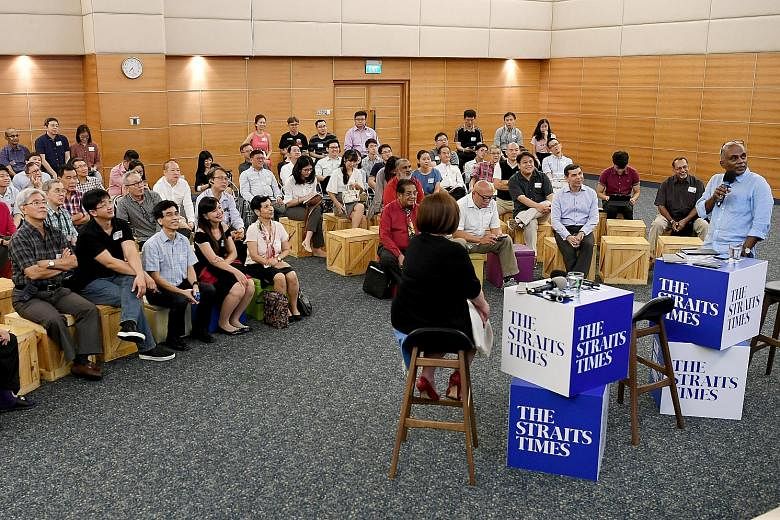Newspapers and newsrooms will continue to exist in the future, even as media organisations worldwide grapple with issues of falling revenue.
But how the news is presented could evolve, and news organisations are experimenting with different business models to find a sustainable way forward, The Straits Times' editor Warren Fernandez said yesterday.
Mr Fernandez, who is also the editor-in-chief of Singapore Press Holdings' (SPH) English, Malay and Tamil Media Group, was speaking at the annual ST Forum Writers' Dialogue.
Along with forum editor Mathew Pereira and digital editor Ong Hwee Hwee, he answered questions ranging from declining media revenue to how forum letters are chosen and the degree of independence media have in Singapore.
About 90 participants attended the lively 11/2-hour session at the News Centre Auditorium.
After the session ended, participants went on a guided tour of ST's renovated newsroom where they gained insights into how content is produced.
Declining revenue for media organisations was one of the issues raised by a participant, who asked what ST can do to address it.
Parent company SPH has been reporting declining profits, amid challenging times for its media division.
In July, it reported a 44 per cent drop in third-quarter net profit to $26.2 million from $46.9 million a year earlier.
But while the revenue for the traditional print media business may be falling, the digital side of the media business continued to enjoy an upswing, with increases in newspaper digital ad revenue and daily average newspaper digital sales.
Mr Fernandez said the audience for ST's digital content online is also growing, with its videos, visual reports and interactive graphics attracting a younger readership.
But newsrooms everywhere were finding that they could not rely on online advertising alone to provide them with the resources needed to produce quality journalism.
Instead, they had to look for many other sources of revenue, such as subscriptions, events, books and other adjacent businesses, he noted. Some media groups were being bought out by billionaires or big business conglomerates. Others were turning to state funding or private sponsorships and donations.
He said: "Online and digital advertising is growing but it is not growing fast enough or large enough, because it is starting from a very low base. Most of it is also being mopped up by the tech giants."
SPH, he noted, is addressing the issue by diversifying its revenue through measures such as growing subscription revenue with paywalls, conducting classes and investing in properties, both here and abroad.
The issue of media viability is a real one that is a concern in many countries around the world, noted Mr Fernandez, who is also president of the World Editors Forum (WEF).
The WEF, which is an international grouping of editors, is actively studying models and best practices that can be applied elsewhere, he added.
Forum editor Mr Pereira, explaining how forum letters are picked for publication, said he receives about 40 to 60 letters daily and which letters are published is decided by the content and whether they bring fresh angles to public discussions.
For example, the debate around personal mobility devices has been the most popular topic among forum writers. But many similar arguments have been raised, which resulted in some letters not being selected for publication.
On questions about editorial independence, Mr Fernandez said: "The Government engages us and we engage them, and we have debates all the time. But I think everyone recognises that the media need room to operate, so that we can be credible. If we lose credibility, it's in no one's interests."
Participants said they enjoyed the frank nature of the discussions.
Student Lee Xuan, 18, said: "Media organisations have been scrutinised a lot... so it was interesting to speak to the editors and understand their perspective."



